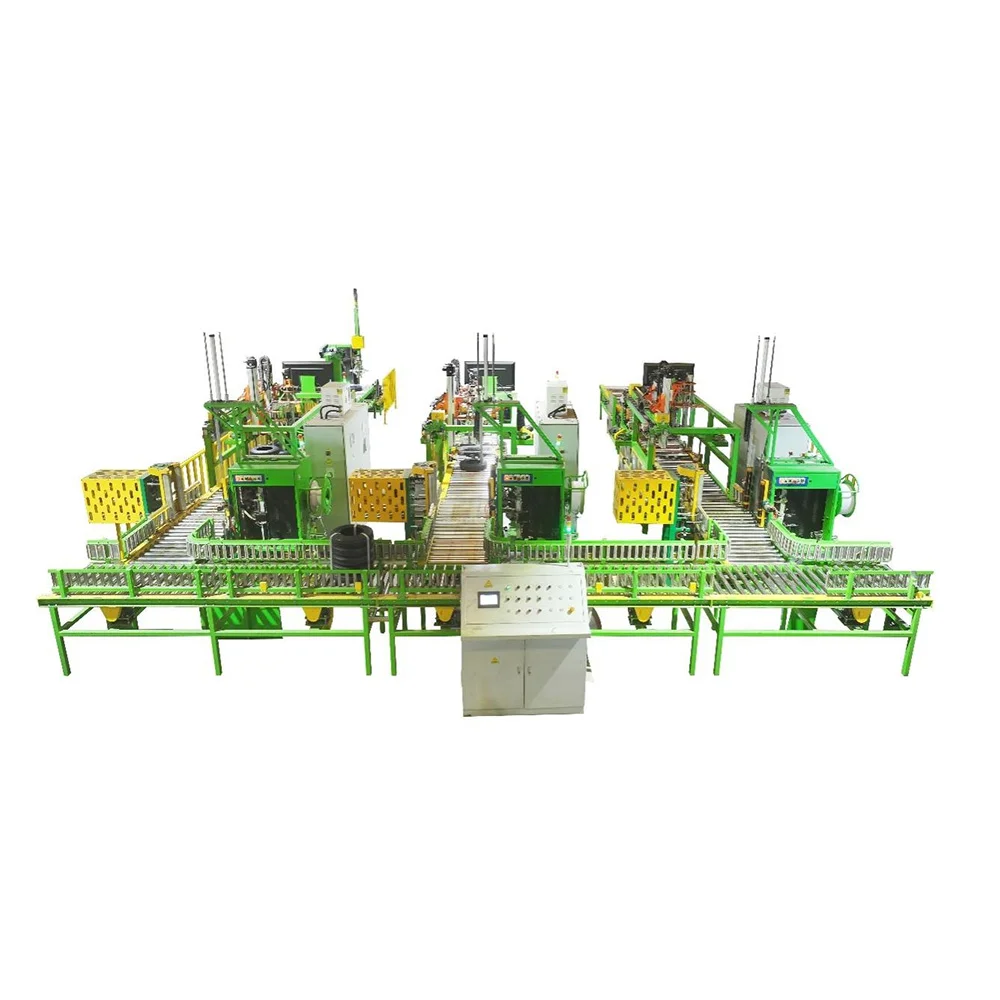The modern tire manufacturing industry is moving toward automation, precision, and efficiency. The tire pallet process line represents a major step forward, integrating multiple operations—from centering and oiling to pallet assembly, stacking, and packaging—into one seamless, intelligent system. In this blog post, SONIWELL, a high quality tire packing machine manufacturing factory, will share the features of tire pallet process line for high efficiency manufacturing.
Functional Integration in the Tire Pallet Process Line
A key feature of a tire pallet process line is its functional integration. Instead of relying on multiple independent machines, this system connects every process stage into one continuous workflow.
Automatic tire centering ensures that each tire is precisely positioned before oiling. The tread oiling system evenly coats the surface, preparing the tire for stacking and long-term storage. Next, the automatic pallet assembly module arranges the tires in stable layers, while servo-controlled stacking guarantees placement accuracy. Finally, the packaging unit secures each stack, with optional plastic sealing for additional protection.
This holistic design minimizes manual handling and reduces process time, resulting in consistent product quality and reduced operational costs.
Adapting to Multiple Tire Pallet Configurations
The tire pallet process line offers exceptional flexibility. It supports various tire pallet configurations, allowing manufacturers to customize setups for different tire sizes and weights.
Depending on production requirements, 3-group, 5-group, or 6-group pallet modes can be selected. These options ensure the line adapts easily to both small-scale and large-scale manufacturing environments. Additionally, the automatic pallet feeding system guarantees continuous operation without interruption, enabling consistent output and reducing downtime.
Such adaptability makes the system suitable for a range of applications—from passenger car tires to heavy-duty truck and off-road tires—meeting diverse market needs.

Precision through Servo-Controlled Modules
Accuracy is crucial in tire pallet processing. The use of servo modules in pallet placement and stacking ensures millimeter-level precision, preventing misalignment and improving the structural stability of tire stacks.
Each servo drive operates with closed-loop feedback control, automatically adjusting for any deviations detected during operation. This results in consistently uniform stacking patterns and stable loads during packaging and transport.
For manufacturers, this precision means fewer product defects, smoother logistics, and improved safety throughout the supply chain.
Safety Design of the Tire Pallet Process Line
Safety is at the core of any automated tire production system. The tire pallet process line integrates multiple layers of protective measures to guarantee operator and equipment safety.
Key safety features include:
-
Grating and safety fences to prevent accidental entry into moving areas
-
Pull-rope emergency switches for immediate machine stoppage
-
Interlocking mechanisms to ensure that only authorized operations can proceed
-
Protective shields and warning signs for hazard awareness
By combining mechanical protection with intelligent control systems, the line reduces workplace risks and ensures compliance with modern industrial safety standards.
Automated Centralized Oil Supply System
The tire pallet line’s automatic centralized oil supply device enhances reliability and reduces maintenance time. Instead of manual lubrication, the system automatically distributes the required oil to all critical points, ensuring consistent operation and extending component lifespan.
The centralized oiling system also monitors consumption in real time, helping operators detect abnormalities early and maintain continuous performance with minimal human intervention.
One-Button Formula Management and Quick Specification Switching
In a production environment where tire specifications often change, flexibility is vital. The formula management system of the tire pallet process line allows operators to switch between tire models with a single button.
All relevant parameters—such as tire dimensions, oiling settings, and stacking height—are automatically adjusted based on pre-stored recipes. This eliminates manual reconfiguration, shortens setup times, and ensures production continuity.
Such intelligent switching capabilities are essential for manufacturers that handle multiple tire types or frequently changing orders, supporting just-in-time production models.
Production Efficiency: Up to 8 Tires per Minute
Efficiency is where the tire pallet process line truly excels. The integrated system achieves stacking speeds of 7–8 tires per minute, representing a major improvement over traditional manual or semi-automated setups.
Because all processes—from loading to final packaging—are automated, no human intervention is required except for tire loading. This minimizes labor costs and improves consistency while maintaining high throughput levels.
For large tire manufacturers, this translates into faster order fulfillment, reduced production bottlenecks, and enhanced competitiveness in a demanding global market.
Sustainability and Operational Optimization
Automation not only improves speed and precision—it also contributes to sustainability. The tire pallet process line optimizes material use, reduces waste oil leakage, and minimizes energy consumption through intelligent control algorithms.
In addition, the optional plastic sealing feature enhances product protection during storage and transport, reducing damage-related waste. This approach supports both environmental responsibility and cost-effectiveness, aligning with the global shift toward greener manufacturing solutions.
Future of Tire Manufacturing Automation
As tire production becomes increasingly complex and diversified, integrated solutions like the tire pallet process line will define the future of smart manufacturing.
By combining high-speed automation, intelligent control, and robust safety systems, this technology enables manufacturers to achieve precision, productivity, and sustainability—all in one process line.
From passenger vehicles to heavy-duty applications, the tire pallet process line provides a reliable foundation for next-generation tire manufacturing—efficient, flexible, and intelligently connected.
www.soniwellgroup.com
SONIWELL